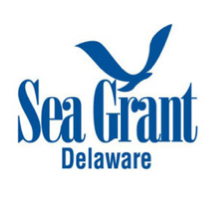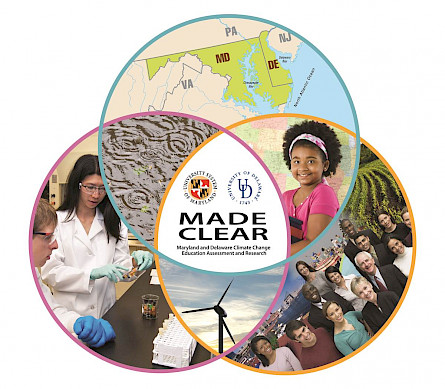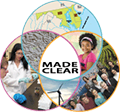Posters for teaching critical thinking about climate change
MADE CLEAR, in collaboration with Jane Hawkey of Integration and Application Network, developed five posters for educators to use to introduce climate change concepts and impacts for grades 7 - 12. The focus is especially relevant to the Mid Atlantic area. Posters and teaching notes are available at this link https://tinyurl.com/climatechangeposters
The posters are on these topics:
Weather, extreme weather, and climate Dissolved oxygen and aquatic life Proxy data used to study past climates
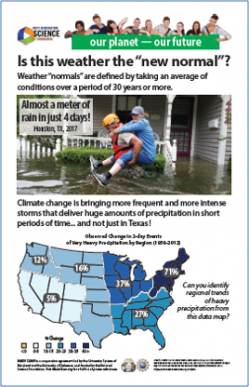
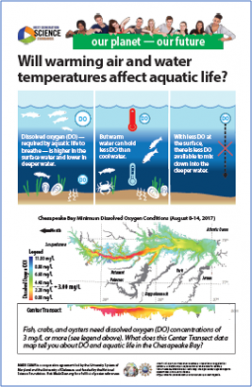
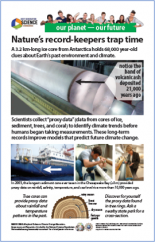
Ocean pH and larval fish behavior Blue Carbon and C sequestration
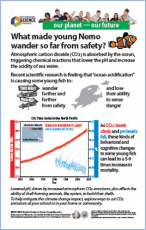
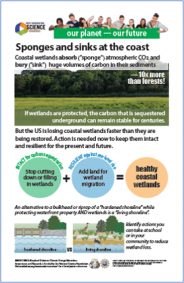
To access the posters and teaching notes, go to https://tinyurl.com/climatechangeposters
For more information, contact Pat Harcourt pharcourt@umces.edu
--------------------------------------------------------------------------------------------------------------------------------------------------------------------------------------------------------------------------------------
Climate Change Academy for Educators
Do you want to teach about climate change?
MADE CLEAR, along with partners at NOAA and Delaware Sea Grant, developed a course on teaching climate change for classroom teachers and informal educators from all subject areas. The course is offered periodically in an online format, and in a blended online plus in-person format. Contact Bart Merrick Bart.Merrick@noaa.gov. to learn more about opportunities to participate in professional development on climate change.
In the Climate Change Academy, educators:
• Learn how to bring climate change and Earth system science into your classes
• Get started with climate change education in a self-paced on-line component
• Meet climate science experts, and use real climate change data
• Try out three-dimensional NGSS-based lessons and field studies
The focus is on lessons and activities to investigate
• The causes and effects of a changing climate
• How climate change is impacting cities, ecosystems, farms, and coastal areas
• Solutions and stewardship activities to address climate change
Questions? Contact Bart Merrick bart.merrick@noaa.gov
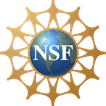
MADE CLEAR was funded by National Science Foundation grant DUE-1239758
The MADE CLEAR project's K-12 team prepared educators from Delaware and Maryland to teach middle and high school students about climate change. The program provided teachers with professional learning opportunities and research tools through our MADE CLEAR Academy and conference sessions. Find out more information in this article about the 2015 Academy.
Since July 2013, over 250 classroom teachers and informal educators participated in our Climate Change Academies. The Academies provided up-to-date science content, model lessons and activities, and practical experience while diving into the complex topic of climate change and preparing educators to introduce it to students. We hosted educators from Brandywine Zoo, the National Aquarium, and various environmental education centers and classroom teachers of mathematics, ELA, social studies, STEM, science, and media services.
Use the map below to see where the Maryland and Delaware educators who attended our first five Academies work. Educators from Massachusetts, New Jersey, and Pennsylvania have also participated.
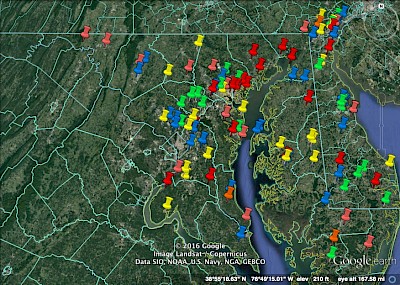
Informal Education
The informal education team developed a collaborative approach, commonly referred to as a Community of Practice to understand the implementation and development of climate education efforts at museums, zoos, aquaria, natural resource agencies, nature centers and other informal education istitutions. The informal climate change education CoP members continue to collaborate to enhance climate change education opportunities offered across learning contexts. The informal education team explored how different approaches to communicating climate change (e.g., application of critical thinking, translation by an educator, personal interpretation by the audience) were utilized by ISE professionals and which strategies work best for conveying climate change science. They described the patterns of interaction among diverse informal science institutions during their participation in the professional development and the CoP. This network analysis investigated how existing relationships were strengthened, new relationships were formed, and how the members engaged in climate change education activities.
Additional information can be found on the Facebook page.


